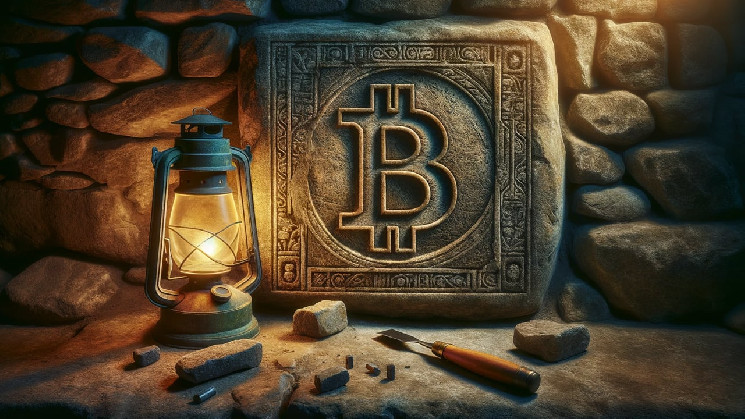On Dec. 15, 2023, a significant milestone was achieved in the Bitcoin blockchain world, just a day shy of the anniversary of the first Ordinal inscription. The total count of Ordinal inscriptions has impressively hit the 48 million mark. Despite initial skepticism about their longevity, these inscriptions have not only persisted but now make up half of all BTC transactions confirmed daily.
Bitcoin Marks 1st Anniversary of Ordinals: 48M Milestone Achieved
2023 has seen Ordinal inscriptions gain immense traction, significantly impacting Bitcoin’s ecosystem and vying with other blockchains in the non-fungible token (NFT) space. This journey began almost a year prior, on Dec. 16, 2022, marking the creation of the first-ever Ordinal inscription on Bitcoin’s distributed ledger.
These Ordinal inscriptions are a sophisticated process that transforms a satoshi, Bitcoin’s smallest unit, into a distinct digital asset. Key network upgrades, notably the Segregated Witness (Segwit) protocol in 2017 and the Taproot upgrade in 2021 have been instrumental in making these inscriptions viable.
Particularly, Taproot’s introduction enabled more intricate transactions and the integration of additional data within a transaction. The essence of the Ordinal inscription process lies in embedding the digital asset’s data into the transaction’s witness section, thereby converting satoshis into unique, non-fungible entities.
This innovative process has also facilitated the creation of fungible tokens, known as BRC20s. As of now, on the eve of the first inscription’s anniversary, a total of 48,054,267 inscriptions have been recorded on the chain.
In terms of monetary value, miners have amassed approximately 3,697.38 BTC, equating to $158.36 million, for verifying these inscriptions. The surge in inscriptions has propelled Bitcoin’s daily transaction count to new records.
Notably, on Nov. 19, 2023, the network saw over 710,000 transactions in a single day. Additionally, a record-breaking day on Nov. 12 witnessed over 505,000 Ordinal inscriptions. Currently, inscriptions account for an estimated 40-50% of the daily transactions processed by bitcoin miners.
The introduction of Ordinals and BRC20s has sparked controversy within the Bitcoin community. A segment of Bitcoin enthusiasts argues that the blockchain should exclusively host financial transactions.
This debate has intensified, especially with Luke Dashjr’s Ocean Pool beginning to exclude inscriptions from its mining block template. While Ordinals have indubitably left their imprint in their first year, the debate over their place in the Bitcoin ecosystem remains heated.
The increase in onchain BTC fees and persistent congestion in the mempool due to unconfirmed transfers have been notable side effects of the inscription trend. At press time, more than 200,000 unconfirmed transactions are waiting for confirmation from miners. On Dec. 6, 2023, the average onchain transfer fee reached $27.55.
In the realm of NFT sales, Bitcoin has emerged as a strong competitor against other blockchains, even surpassing Ethereum in NFT sales in November. This trend continued into early December, with seven-day figures showing Bitcoin NFT sales at $199 million, doubling Ethereum’s $99 million.
Additionally, according to cryptoslam.io, six of the top ten NFT collections in weekly sales are Bitcoin-based. One of the most expensive NFT sales on Bitcoin this week was a Van Gogh painting embedded to the blockchain.
What are your views on the 2023 trend of Ordinal inscriptions? Do you favor the concept of inscriptions, or do you think Bitcoin should be reserved solely for financial transactions? We welcome your thoughts and opinions on this matter in the comments section below.
Read the full article here

